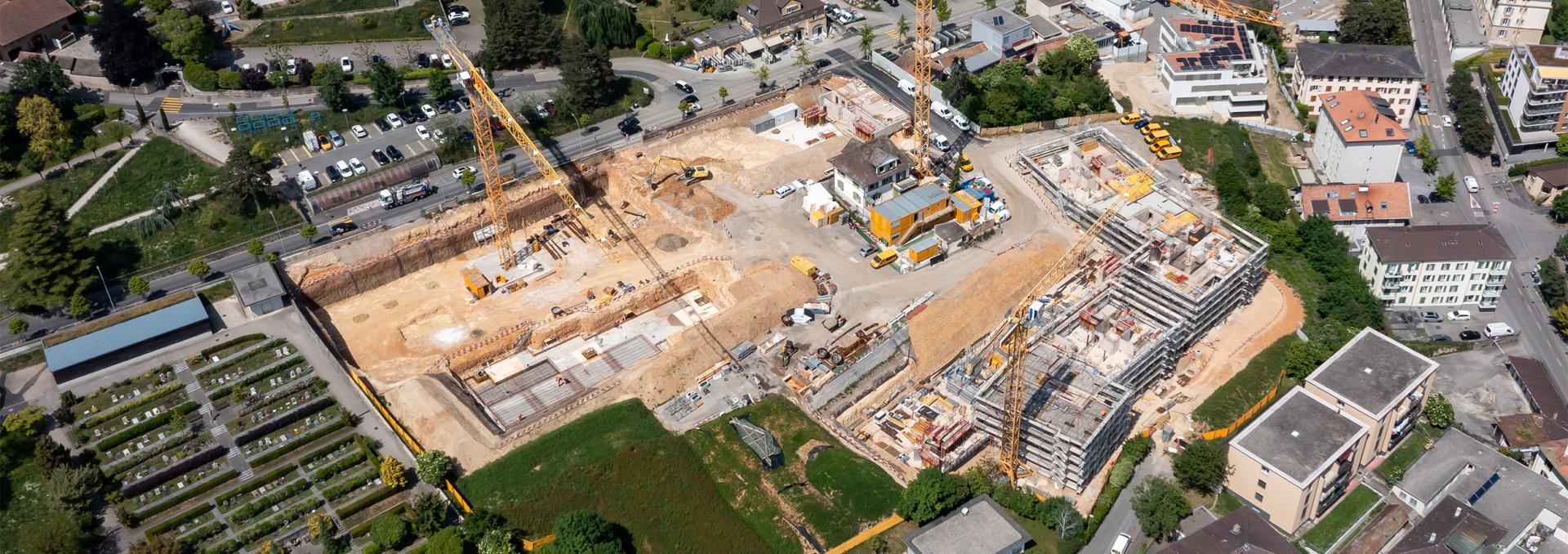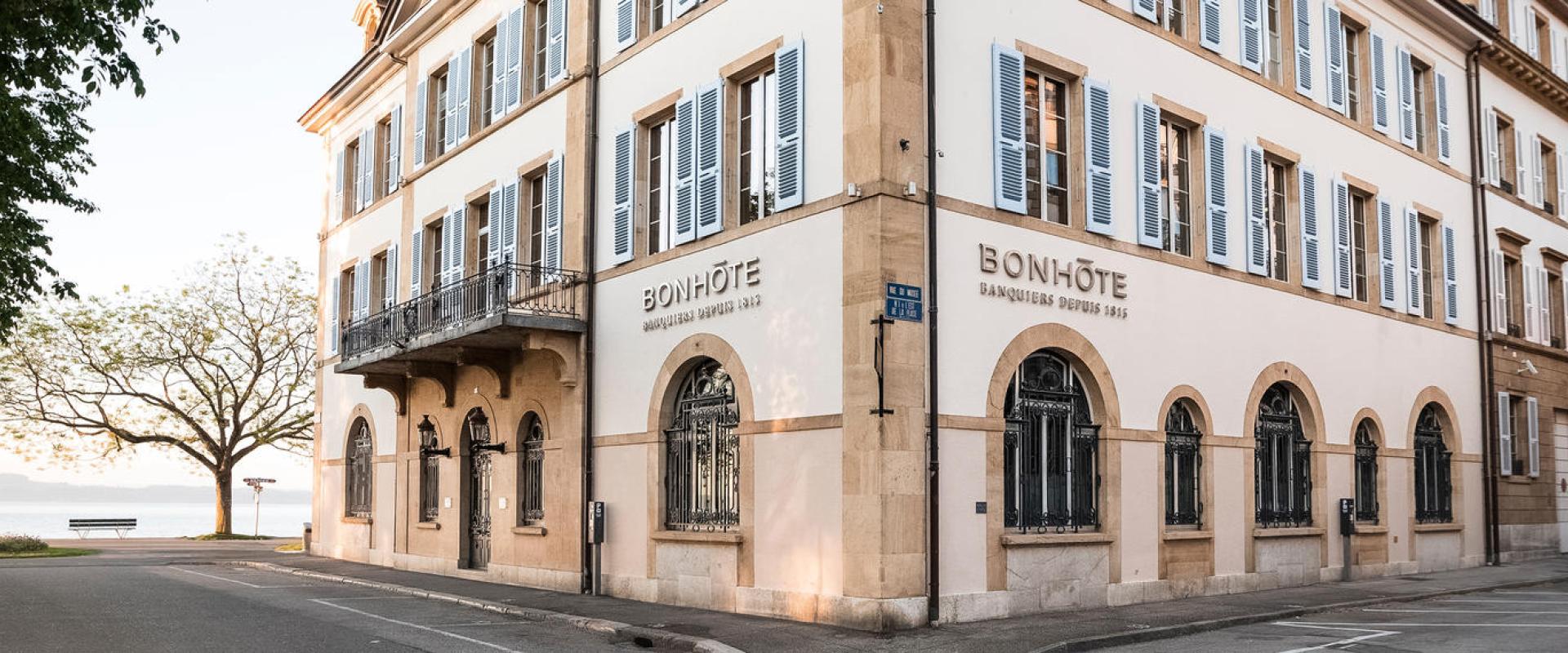

Bonhôte-Immobilier SICAV Ordinary General Meeting 2025
23/06/2025
Open-ended investment company (SICAV) of the “real estate funds” category
Registered office: c/o Banque Bonhôte & Cie SA, 2, quai Ostervald, 2001 Neuchâtel
Commercial Register of the canton of Neuchâtel: CHE-396.569.515
The shareholders are convened for an
ORDINARY GENERAL MEETING
MONDAY 14 JULY 2025, AT 10:00 A.M.
At the registered office of Bonhôte-Immobilier SICAV – 2, quai Ostervald – 2001 Neuchâtel
Preamble
The Chairman announces the list of shareholders attending the Ordinary General Meeting.
Agenda
- 1. Annual report, annual financial statements for the financial year ended 31 March 2025 / Approval of the General Meeting / Statutory Auditor’s report
The Board of Directors proposes to approve the annual report and annual financial statements for the 2024 – 2025 financial year ending on 31 March 2025.
- Appropriation of income
The Board of Directors proposes to allocate the profit as follows:
Investor Sub-fund - BIM: The Board of Directors proposes to distribute a dividend from the net profit of CHF 3.39 per share, i.e. CHF 28,103,201.70, and thus carry forward CHF 10,857,747.95
The retained earnings of the “capital gains available for distribution” item amounted to CHF 19,882,296.31 at 31 March 2025.
Investors may choose to receive their dividend in cash or in the form of new shares according to the issue prospectus.
- Discharge of the members of the Board of Directors for the 2024 – 2025 financial year ending on 31 March 2025
The Board of Directors proposes to discharge members of the Board of Directors from obligations for duties fulfilled.
- Elections
4.1 Board of Directors
4.1.1 Yves de Coulon (re-election)
The Board of Directors proposes to re-elect Yves de Coulon as a member of the Board of Directors of Bonhôte-Immobilier SICAV for a further term of office of one year, ending with the Ordinary General Meeting of shareholders to be held in 2026.
4.1.2 Jean-Paul Jeckelmann (re-election)
The Board of Directors proposes to re-elect Jean-Paul Jeckelmann as a member of the Board of Directors of Bonhôte-Immobilier SICAV for a further term of one year, ending with the Ordinary General Meeting of shareholders to be held in 2026.
4.1.3 Geraldine Bosshart Brodard (re-election)
The Board of Directors proposes to re-elect Géraldine Bosshart Brodard as a member of the Board of Directors of Bonhôte-Immobilier SICAV for a further term of one year, ending with the Ordinary General Meeting of shareholders to be held in 2026
4.1.4 Laurent Staffelbach (re-election)
The Board of Directors proposes to re-elect Laurent Staffelbach as a member of the Board of Directors of Bonhôte-Immobilier SICAV for a term of one year, ending with the Ordinary General Meeting of shareholders to be held in 2026.
4.2 The Statutory Auditor
The Board of Directors proposes to re-elect KPMG SA, Geneva as the Statutory Auditor of Bonhôte-Immobilier SICAV for the 2025 – 2026 financial year.
Changes to the SICAV’s investment rules
The Board of Directors proposes to read and approve the following changes to the investment rules, subject to FINMA approval:
5.1 § 1 – Company name and registered office of the real estate SICAV, fund management company, custodian bank and asset manager
§ 1 is supplemented as follows:
6. At the request of the real estate SICAV and the custodian bank and in accordance with Art. 78 para. 4 CISA, FINMA exempted the real estate SICAV from:
the obligation to pay the shares in cash;
the obligation to issue in tranches and offer the new shares as a priority to investors as part of contributions in kind.
5.2 § 5 – Shareholder eligibility
§ 5 para. 2 is amended as follows:
2. By subscription and payment in cash, investors acquire a stake in the real estate SICAV, in relation to the sub-fund in question, and the profit resulting from its balance sheet. Instead of payment in cash, a contribution in kind may be made in accordance with § 17.8, at the investor’s request and with the approval of the real estate SICAV.
5.3 § 17 – Issue and redemption of shares as well as trading
§ 17 is supplemented as follows:
8. Each investor may request, in the event of subscription, to make a contribution to the assets of the fund instead of paying cash (“contribution in kind”). The application must be submitted together with the subscription. The real estate SICAV is not required to authorise contributions in kind.
The real estate SICAV alone decides on the contributions in kind and only authorises such transactions if their execution is fully in accordance with the fund’s investment policy and does not compromise the interests of other investors.
Costs related to a contribution in kind may not be charged against the fund’s assets.
For contributions in kind, the real estate SICAV prepares a report containing information on the various investments transferred, the market value of these investments on the reference day of the transfer, the number of units issued, and any offsetting of the balance in cash. For each contribution in kind, the custodian bank verifies compliance with the duty of loyalty by the fund management as well as the valuation on the reference day determining the investments transferred and units issued. The custodian bank immediately announces its reservations or criticisms to the audit company.
Transactions involving contributions in kind must be mentioned in the annual report.
5.4 § 19 – Fees and incidental costs charged against the sub-fund’s assets
§ 19 para. 12 (last sentence) is supplemented as follows:
12. […]
The real estate SICAV and its agents do not grant any discounts during distribution in or from Switzerland to reduce the fees and costs borne by shareholders and charged to the sub-fund.and its agents may, in accordance with the provisions set out in the prospectus, pay discounts directly to investors, upon request, for distribution in or from Switzerland. Discounts are used to reduce the fees or costs borne by the investors concerned.
At the investor’s request, the real estate SICAV or its agents will disclose the amount of the corresponding discounts free of charge.
Amendment to the SICAV’s articles of association
The Board of Directors proposes to read and approve the following amendments to the articles of association, subject to FINMA’s approval:
Article 2 para. 1 has been amended as follows:
Article 2 Purpose
1 The sole purpose of the real estate SICAV is to manage its wealth or sub-funds in the form of a collective investment scheme in accordance with the CISA (“Collective Investment Schemes Act”) and its ordinances and to form the investors’ share capital and carry out the distribution for investor shares.
he SICAV invests the investor compartments in the investments stipulated in Art. 59 CISA, specifically:a. Real estate and its ancillary facilities;b. Participations in real estate companies whose sole purpose is the acquisition and sale, or the rental and leasing of their properties, and in claims against such companies, provided that the real estate fund holds at least two-thirds of their capital and voting rights;c. Units of other real estate funds as well as listed real estate investment companies, up to a maximum of 25% of the fund's total assets;d. Foreign real estate securities if their value can be satisfactorily assessedThe investment policy and its restrictions, as well as the investment techniques and instruments, are set out in detail in the investment rules.
The entrepreneurs compartment of the real estate SICAV primarily invests in liquid securities (money market funds, short-term bonds, cash, etc.).Article 6 para. 5 has been amended as follows:
Article 6 Shares
[…]
5 Shareholders may not require the securitisation of their shares in paper form. Shares are not issued as securities but as book entries. They may be issued in the form of intermediated securities under the Swiss Federal Intermediated Securities Act (FISA). However, the Board of Directors may decide to incorporate the investor shares in the form of a durable or technical global bearer certificate, jointly owned by the shareholders according to their portfolio of shares in the real estate SICAV. Ending co-ownership or splitting the global certificate is only possible by amending the articles of association.
Article 12 para. 2 lit. a. second paragraph has been amended as follows:
Article 12 Shareholder circles
In particular, the shares of the sub-funds or share classes of the SICAV are not registered under the US Securities Act of 1933 (“Securities Act”) or under the applicable laws of any other US State. Consequently, the SICAV’s shares may not, directly or indirectly, be offered or subscribed to (i) in the United States of America, unless this subscription is made possible by an exemption from the registration requirements of the Securities Act
de l’Act 1933and is permitted under all other applicable regulations of the United States, (ii) or to US Persons as defined by the Securities Act.Article 18 para. 1 (powers to the General Meeting) has been amended as follows:
Article 18 Powers
1 The General Meeting of shareholders is the supreme body of the SICAV. It has the inalienable right:
a. to adopt and amend the articles of association;
b. to appoint and dismiss the members of the Board of Directors and the Statutory Auditor;
c. to approve the annual report;
d. to approve the annual financial statements and determine the use of the profit resulting from the balance sheet in the context of the distributions authorised in accordance with the investment rules and Art. 31;
e. to determine the interim distributions and approve the interim statements necessary for this purpose;
f. to discharge members of the Board of Directors from obligations for duties fulfilled;
g. for listed sub-funds, to discount the company’s equity securities;
h. for listed sub-funds, to elect the independent representative;
i. to make all decisions reserved for it by law or the articles of association;
j. to amend the investment rules if:
- this is not required by law,
- the rights of the shareholders are concerned, and
- if the change is not exclusively of a formal nature.
Article 19 has been amended as follows:
Article 19 Notice of meetings
[…]
4 Shareholders may request the convening of the General Meeting if together they hold at least:
a) 10 per cent of the votes of the real estate SICAV;
b) if only certain sub-funds are concerned,
i. 10 per cent of the votes of the unlisted sub-fund concerned or
ii. 5 per cent of the votes of the exchange-traded sub-fund concerned;
5 The convening of a General Meeting must be requested in writing. Agenda items and proposals must be mentioned in the request.
Article 20 has been amended as follows:
Article 20 Form of the notice, inclusion on the agenda
1 A General Meeting shall be convened by publication of the invitation in the real estate SICAV’s publication media no later than 20 days before the date of the meeting. The notice of meeting states i) the date, time, form and place of the General Meeting, ii), indicating the items on the agenda, iii)as well as the proposals of the Board of Directors with a brief explanatory text for listed sub-funds, iv)et if applicable, the proposals of the shareholders with a brief explanatory text and, (v) if applicable, the name and address of the independent representative who have requested that a general meeting be held or an item be placed on the agenda. Shareholders may also be informed directly in writing.
2 Shareholders who have at least 10 percent of the votes of all the sub-funds, or of individual sub-funds if only these are concerned, may request the inclusion of items on the agenda, provided that this request is received by the real estate SICAV in writing at least 45 days before the General Meeting.
3 No decision may be taken on matters that have not been duly included on the agenda, except on proposals to convene an Extraordinary General Meeting, the establishment of a special review or the appointment of an auditor. It's not possible to make decisions on items that haven't been announced in this way. However, the decision to convene an extraordinary general meeting is an exception. No prior notice is required for presenting proposals related to agenda items or for discussions where no decision will be made.
4 The Board of Directors shall ensure that the items on the agenda adhere to a unity of purpose and provide the General Meeting with all the information required for decision-making. The Board of Directors may make a brief presentation of the items on the agenda in the notice of meeting provided that it makes more detailed information available to shareholders by other means.
45 20 calendar days at the latest before the Ordinary General Meeting, the annual report and the Statutory Auditor’s report are available for consultation at the registered office of the real estate SICAV for consultation by the shareholders. This point must be mentioned in the notice of the General Meeting. If the documents are not accessible electronically, any shareholder may request that these documents be sent to them in a timely manner.
6 If the management report in the form approved by the General Meeting and the audit reports are not available in electronic format, any shareholder may, during one year from the General Meeting, request that these documents be sent to them in due time. After the general meeting, if the documents are not available electronically, any shareholder can, for one year following the ordinary general meeting, request that the annual report (in the form approved by the general meeting) and the audit reports be sent to them.
Article 21 has been amended as follows:
Article 21 Chair, meeting officers, minutes
[…]
4 The minutes shall mention: (i) the date, time of start and end, as well as the form and place of the General Meeting, (ii) the number, type, nominal value and class of the shares represented, specifying those represented by the independent representative, those represented by a member of a corporate body and those represented by the custodian representative, (iii) the decisions and the outcome of the elections, (iv) the requests for information made at the General Meeting and the responses given, (v) the declarations for which the shareholders request registration and (vi) the significant technical problems occurring during the General Meeting.
5 Any shareholder may require that the minutes be made available to them within 30 days of the General Meeting.
6 For listed sub-funds, the decisions and results of the elections, with an indication of the exact distribution of votes, are made accessible in electronic format within 15 days of the General Meeting.
Article 22 has been amended as follows:
Article 22 Participation rights
[…]
3 A shareholder entitled to vote may be represented at the General Meeting by another shareholder holding the same right or by a third party. For listed sub-funds, representation by a member of a corporate body and representation by a custodian are prohibited. The real estate SICAV specifies in the meeting notice the required proof of power of representation.
4 For listed sub-funds, the General Meeting elects an independent representative. If the General Meeting has not appointed an independent representative, the Board of Directors shall appoint one for the next General Meeting.
4 5 The Chair of the General Meeting shall decide on the eligibility of representation.
Article 24 has been amended as follows:
Article 24 Decision-making, et elections, place of meeting, use of electronic media
1 The General Meeting shall always make its decisions and carry out elections by absolute majority of the votes allocated to the shares represented, unless the law or the articles of association provide otherwise. In the event of a tie, the chairman has a casting vote.
2 If an election does not yield a result in the first round, a second round with relative majority is carried out.
3 Elections and votes shall be done by show of hands, unless the Chair orders a vote by secret ballot or the General Meeting so provides.
4 The Board of Directors decides where the General Meeting is held. The determination of the place of meeting must not, for any shareholder, complicate the exercise of their rights relating to the General Meeting in a manner that is unfounded. The General Meeting may be held simultaneously in several places if the presentations are broadcast live by audiovisual means at all the meeting sites. The Board of Directors may authorise shareholders who are not present at the place where the General Meeting is held to exercise their rights electronically.
5 The General Meeting may be held electronically and without a physical meeting place if the Board of Directors appoints an independent representative in the notice of meeting. For unlisted sub-funds, the Board of Directors may waive this appointment of an independent representative if all shareholders agree.
6 The Board of Directors decides on the use of electronic media. If electronic media are used, the Board of Directors ensures that the identity of the participants is established, that speakers at the General Meeting are broadcast live, that any participant can make proposals and take part in the debates and that the result of the vote cannot be falsified. If the General Meeting does not take place in accordance with the requirements due to technical problems, it must be reconvened. Decisions taken by the General Meeting before the technical problems arose remain valid.
Article 26 para. 3 and 4 (chapter on the Board of Directors) has been amended as follows:
Article 26 Senior management, responsibilities
[…]
3 The Board of Directors shall have the following non-transferable and inalienable functions:
a) carry out the senior management of the real estate SICAV and draw up the necessary instructions;
b) establish the organisation and by-laws;
c) determine the principles of accounting and financial control as well as the financial plan;
d) appoint and dismiss, on the basis of the organisational rules, any members of the Board of Directors and third parties responsible for management and representation, and regulate signatory authority;
e) exercise close supervision over the persons responsible for the conduct of business of management to ensure, in particular, that they comply with the law, articles of association, rules and instructions given;
f) draw up the management annual report, prepare the General Meeting and execute its decisions;
g) publish the prospectuses and the annual and semi-annual reports;
h) inform the Swiss Financial Market Supervisory Authority (FINMA) in the event of over-indebtedness;
i) establish, amend and implement the principles of the investment policy and establish the investment rules, insofar as this is not reserved for the General Meeting of shareholders in accordance with Art. 18 para. 1 let. g;
j) appoint the custodian bank and decide on a possible change of custodian bank;
k) decide on the delegation of the SICAV’s administration to a fund management company and respectively the delegation of investment decisions to a fund management company or collective investment manager regulated by a recognised supervision body, as well as the delegation of other sub-tasks to a fund management company or to qualified third parties, subject to the authorisation of FINMA;
l) instruct, monitor and inspect agents;
m) ensure the creation, implementation and maintenance of an effective internal control system (ICS);
n) determine the business strategy and policy;
o) determine the guidelines for the use of derivatives, securities lending and repurchase transactions;
p) appoint and dismiss the statutory auditor in accordance with the CISA and process its reports;
q) decide to acquire and sell real estate assets essential for the direct exercise of the SICAV’s activities;
r) appoint the valuers in charge of the appraisals in agreement with the fund management company;
s) decide on the principles relating to the valuation of investments;
t) decide to create new investor sub-funds and new share classes.
4 The Board of Directors may delegate all or part of the following duties based on the organisational rules and under the relevant provisions of the laws on investment funds:
a) preparing the prospectus and the key information document or any other equivalent document in force (respectively key investor information);
b) establishing the investment rules;
b)c) creating new sub-funds and new share classes;
c)d) the administration (including risk management, compliance, calculating the net asset value, determining issue and redemption prices, preparing the accounting, operating the IT system and any other administrative or logistics tasks of the SICAV and respectively its sub-funds, such as tax statements or the reimbursement of withholding tax);
e) investment decisions;
d)f) executing the SICAV’s decisions concerning the issue and redemption of shares;
e)g) legal and tax advice;
f)h) distributing investor shares, including the conclusion of distribution agreements;
g)i) implementing decisions concerning the valuation of investments;
h)j) preparing all publications such as prospectuses and the key information document or any other equivalent document in force, annual and interim reports and other publications intended for investors;
i)k) preparing the accounts;
j)l) complying with reporting obligations;
k)m) implementing the internal control system (ICS).
Article 30 has been amended as follows:
Article 30 Quorum, decision-making, protocol, place of meeting, use of electronic media, written decision-making
[…]
5 The Board of Directors may take its decisions (i) in a meeting with a place of meeting, in which case it may provide that members who are not present at the place of meeting may participate by electronic means (ii) in electronic form without a place of meeting, by analogy with Articles 701c to 701e of the Swiss Code of Obligations (CO), (iii) in writing on paper or in electronic form, unless a discussion is requested by one member of the Board of Directors. In the case of a decision made via electronic means, no signature is required; diverging written decisions of the Board of Directors are reserved.
6 The Board of Directors decides on the use of electronic media. It shall ensure that the identity of the participants is established, that presentations are broadcast live, that any participant can make proposals and take part in the debates and that the result of the vote cannot be falsified.
7 If the meeting does not take place in accordance with the requirements due to technical problems, it must be reconvened. Decisions taken by the Board of Directors before the technical problems arose remain valid.
5 The decisions of the board of directors can be made by circular resolution, whether by letter, email, or telefax, provided that the request has been sent to all board members and no member has requested an oral discussion.
- Proposal of an independent representative
The Board of Directors proposes to appoint Maître Christian Blandenier, notary in Cernier as an independent representative until the end of the next Ordinary General Meeting of shareholders, to be held in 2026.
- Any other business
An aperitif will be served at the end of the meeting.
Neuchâtel, 20 June 2025
Bonhôte-Immobilier SICAV
The Board of Directors
INFORMATION ON THE AGENDA
The annual financial statements, the annual Board of Directors’ report and the Statutory Auditor’s report are made available to the shareholders at the registered office of Bonhôte-Immobilier SICAV, c/o Banque Bonhôte & Cie SA, 2, quai Ostervald, 2001 Neuchâtel, as well as at the CACEIS fund management company (Switzerland) SA, 35, route de Signy, 1260 Nyon. Each shareholder may request that a copy of these documents be issued to them.
PARTICIPATION AND REPRÉSENTATION
Holders of bearer shares in the Bonhôte-Immobilier SICAV Investisseurs-BIM sub-fund may attend the Ordinary General Meeting. To this end, they ask their bank for a document confirming the holding of the shares with a banking institution and the blocking of the shares until the date of the General Meeting on 14 July 2025 at 10 a.m. inclusive. By sending this document to CACEIS (Switzerland) SA, at the address indicated below until 2 July 2025, shareholders will receive, at the room’s entrance, their admission card and voting materials for the General Meeting.
Shareholders who have not taken the steps mentioned above will not have access to the General Meeting.
For shareholders wishing to be represented, they request this by submitting their certificate from the bank in accordance with the above terms and conditions, they will receive a participation card as well as a voting instruction form and a proxy for the independent representative. These documents, duly completed and signed, must be sent by post to the independent representative: Maître Christian Blandenier - 1, impasse du Noyer - P.O. box 178 - 2053 Cernier or by email to: christian.blandenier@notav.ch until 8 July 2025 at the latest. The independent representative will vote according to the instructions of the shareholders provided that he has received a participation card, a proxy and voting instructions by 8 July 2025 at the latest.
Documents
Prospectus with integrated investment rules and articles of association (including a version tracking amendments) may be consulted by the shareholders 20 days before the Ordinary General Meeting at the registered office of Bonhôte-Immobilier SICAV, c/o Banque Bonhôte & Cie SA, 2, quai Ostervald, 2001 Neuchâtel, as well as at the fund management company of Bonhôte-Immobilier SICAV, CACEIS (Switzerland) SA, at the address indicated below.
Each shareholder may request that a copy of this document be sent to them by ordinary post.
FUND MANAGEMENT COMPANY CONTACT ADDRESS
Caceis (Switzerland) SA
35, route de Signy
1260 Nyon
If you have any questions, please do not hesitate to contact: LEGAL.CH@caceis.com
Neuchâtel, le 20 juin 2025
Bonhôte-Immobilier SICAV
The Board of Directors
Contact us

Real estate fund investor
The Bonhôte-Immobilier SICAV subfund allows shareholders to invest in real estate by spreading the risk over several properties and without the need to cash in investments at any particular time in the future.

Strategy and investments
The fund’s objective is to build a stable and dynamically managed real estate portfolio.

